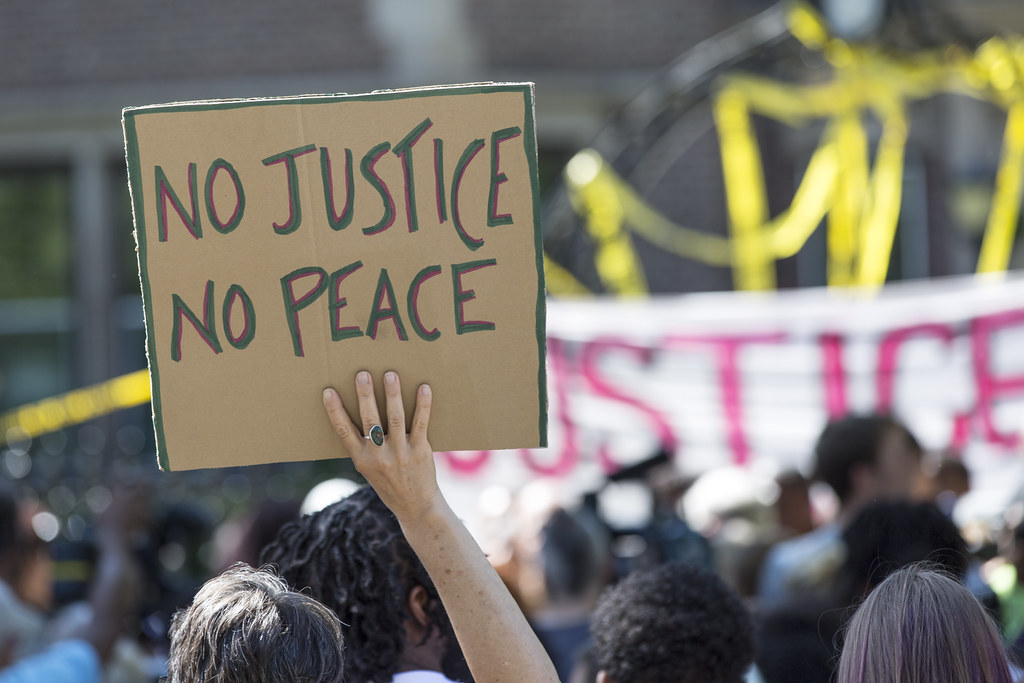
Then justice will dwell in the wilderness,
and righteousness abide in the fruitful field.
The effect of righteousness will be peace,
and the result of righteousness, quietness and trust forever.
My people will abide in a peaceful habitation,
in secure dwellings, and in quiet resting places.*
-Isaiah 32:13-18
As the threat from Covid-19 appears to be gradually subsiding in this country – not that the threat of the pandemic has gone away; it is still with us, with new and perhaps more deadly variants showing up, but after a year, and after many of us have received vaccinations – attention is turning or being turned to other issues. One of these is the almost daily demonstrations taking place against the police. The slogan “no justice, no peace” is being heard and seen more and more often. The slogan is not particularly new; it became associated in the nineteen-eighties with protests against police violence in New York City. It has had a resurgence now, not because the underlying issue ever went away, but because increased attention is now being given to it.
Almost fifty years ago, Pope Paul VI delivered a message for the World Day of Peace on January 1, 1972. He said, “If you want peace, work for justice.”* These words were true then and are just as true today. Without justice it is not possible to have true lasting peace, not in the world, not in our country, not in our local communities, not in our church, and not in ourselves. The mere absence of civil and social conflict is not an indication of genuine peace. For it may be imposed by political, societal or religious forces and customs which mask over deep-seated problems, and they will remain covered over until such time as the forces and powers are weakened. And then the disturbances which lay hidden underneath are exposed and come to view. While this upsetting and disruptive, know that disorders and evils cannot be dealt with until they come out into the open (Divine Providence §278). This is true both for an individual and as well as for a larger or smaller society.
The connection between justice and peace is evident from many passages in the Word of the Lord. Isaiah 32 states that the effect of justice will be peace. Psalm 85 verse ten states that righteousness (or justice) and peace have kissed each other. Arcana Coelestia 3574 tells us that this signifies their conjunction together. Consider for a moment that if we do not treat others with justice, that is, with fairness, as we ourselves would like to be treated, there is not likely to be a peaceful relationship. And this is true both for individual relationships and for society in general. To return to Isaiah 32, notice that the effect or work of justice not only is peace, but also results in tranquility and trust. Where justice and fairness are not practiced, a sense of trust will be absent.
The connection between justice and peace is like that between the two Great Commandments. Just as the first commandment relates to love to the Lord, and the second to love to the neighbor, so also “peace” relates to the Lord, and “justice” to the neighbor. We cannot be in one without the other. Peace in the highest sense signifies the Lord Himself. In the prophecy in Isaiah 9:6-7, the Prince of Peace is the Lord.
Concerning peace we read this in Arcana Coelestia §5662:
… peace in heaven is like spring on earth, or like the dawn, which does not affect us by sensible changes, but by a universal pleasantness that flows into everything that is perceived, and fills with this pleasantness not only the perception itself but also the individual objects.***
At the present day scarcely anyone knows the meaning of “peace” where it is mentioned in the Word, as in the benediction, “Jehovah lift up His faces upon you, and give you peace” (Num. 6:26); and in other places. Almost everyone believes peace to be security from enemies, and also tranquility at home and among companions. Such peace is not meant in this passage, but a peace which immeasurably transcends it – the heavenly peace just now spoken of. This peace can be bestowed on no one unless he is led by the Lord and is in the Lord, that is, in heaven where the Lord is all in all; for heavenly peace flows in when the lusts arising from the love of self and the love of the world are taken away.
These are what take peace away, for they infest a person’s interiors, and at last cause him to make rest consist in unrest, and peace in annoyances, because his delight is in evils. So long as a person is in these he cannot possibly know what peace is, indeed, during that time he believes that such peace is nothing; and if anyone says that it becomes perceptible when the delights from the love of self and the world are taken away, he laughs, because he makes peace consist in the delight of evil, which is the opposite of peace.
We read further regarding what peace is like and also what takes away peace:
(Peace) is like dawn on the earth, which gladdens minds with universal delight; and the truth of peace is like the light of the dawn. This truth, which is called “the truth of peace,” is the Divine truth itself in heaven from the Lord, which universally affects all who are there, and makes heaven to be heaven; for peace has in it confidence in the Lord, that He directs all things, and provides all things, and that He leads to a good end. When a person is in this faith, he is in peace, for he then fears nothing, and no solicitude about things to come disturbs him. A person comes into this state in proportion as he comes into love to the Lord.*** (AC §8455)
On the other hand:
All evil, especially that of self-confidence, takes away a state of peace. It is believed that an evil person is at peace when he is in gladness and tranquility because all things succeed with him. But this is not peace; it is the delight and tranquility of intense desires, which counterfeit a state of peace. But in the other life this delight, being opposite to the delight of peace, is turned into what is undelightful, for this lies hidden within it.
In the other life the exteriors are successively unfolded even to the inmosts, and peace is the inmost in all delight, even in what is undelightful with a person who is in good. So far therefore as such a person puts off what is external, so far a state of peace is revealed, and so far he is affected with satisfaction, blessedness, and happiness, the origin of which is from the Lord Himself.*** (AC §8455)
When we see those signs that say “no justice, no peace,” let us raise our minds above the political message being displayed, and see the truth of the heavenly message that lies within. Where there is no charity toward the neighbor, where there is no regard for treating others as we ourselves would wish to be treated, which is at the core of justice, there can be no love to the Lord who is the source of all peace, who is peace itself. That slogan printed on the sign, while perhaps meant to be a political message, is actually a spiritual message that we can take to heart and soul, for at its core, it embodies the teaching of our Lord.
*New Revised Standard Version Bible, copyright © 1989 National Council of the Churches of Christ in the United States of America. Used by permission. All rights reserved worldwide.
**Pope Paul VI, “Speech at World Peace Day 1972”. Libreria Editrice Vaticana. Vatican City, 1972.
***Swedenborg, Emanuel. Arcana Coelestia. Translated by John Potts. West Chester, PA: Swedenborg Foundation, 1998.

The Rev. Hugh Odhner is minister at the Lord’s New Church Philadelphia Society. A bridge-builder between the different Swedenborgian branches, he has preached at several Convention ministries, including the Church of the Holy City in Washington, D.C., and has been a regular attendee and lecturer at Fryeburg New Church Assembly for many years. He lives with his wife Denise in Bryn Athyn, PA.